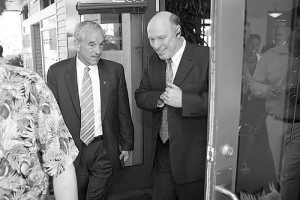The Unlikely FORERUNNER

In 2016 Donald Trump, a successful businessman and TV personality with no discernible governing philosophy, stunned the political world, and the nation at large, with his victory in the electoral college over Hillary Rodham Clinton. Despite his riches and name ID, Trump was viewed as a long shot at best. However, Trump’s wealth was evidence of potential viability and independence from “politics as usual.” Many voters perceived him as an outsider with the independence to defy elites in both parties with whom they had become dissatisfied over both foreign and domestic policy. The hallmark of the Trump campaign was the intensity of support for him displayed in large rallies, where people attended to hear straight talk from a different kind of candidate who, warts and all, was deemed to be authentic.
Trump’s celebrity status, huge unfiltered online megaphone, and outrageous statements caused him to dominate the news cycle day after day, contribute to his image as an outsider, and add to his following. Growing numbers filled rallies where he covered many issues in uncharacteristically long speeches.
The three-issue areas where Trump drew the most enthusiastic response from these large crowds were immigration, which he promised to bring under control; trade deals, which he pronounced unfair and resulted in good American jobs going overseas, primarily to China; and “endless wars,” like Iraq and Afghanistan, which in 2016 did not seem to be necessary to defend America.
Eight years earlier a little-known Texas congressman with a clear if marginalized governing philosophy stunned the political world and the leadership of the Republican party by garnering a young, enthusiastic, mostly online following. Ron Paul looked on in amazement as these supporters also filled large rallies listening to his long speeches. As in the case of Trump, Paul’s better-known rivals for the GOP presidential nomination often had difficulty filling a room. Paul’s fans also gave him a record amount of online donations, bypassing the fund-raising apparatus that served to control the content of a candidate’s message. Ron Paul was clearly an outsider whose consistent record over many years of attacking the political elites of both parties evinced the independence of a truth-teller, an authentic voice standing up for the people rather than the elites.
Eight years earlier, Paul had spoken out on those three primary issues driving the Trump campaign. He too decried uncontrolled immigration, the NAFTA and PNTR trade deals, and the commitments overseas resulting in what he also called “endless wars.”
In addition, both men repeatedly attacked an out-of-control federal government and went far beyond the standard Republican complaint of over-regulation. Paul sounded the alarm against a coming police state in attacking the Patriot Act, and Real ID. Trump introduced most Americans to the idea of a “Deep State” of unelected bureaucrats embedded in key places of governance to thwart the popular will and constitutional liberty in favor of a powerful status quo. Both viewed current immigration, trade, and foreign policy as being crafted for elites and against the national interest.[1]
Paul did not, like Trump, capture the GOP base, but he showed there was a way to defy party elites on these issues and gain traction. Paul and Trump each entered the presidential arena at a time when there was a tremendous hunger for authentic candidates. This grassroots energy was empowered by new tools that became available to communicate, organize, and fundraise. A political campaign could be successful while bypassing the usual political structures. Meanwhile, in the background, key political issues festered, unaddressed by elites increasingly at odds with the GOP grassroots.
Despite drastically different personalities, campaign styles, and philosophical moorings, first Paul, and then Trump, tapped into this new environment. Trump was familiar to a much larger number of voters as a TV celebrity. He was also unencumbered by the ideological confines that animated and validated the authenticity of Dr. Paul. Trump was free to demand low interest rates, promise bailouts, contemplate new taxes on the rich, and avoid moral pronouncements in foreign policy. Nonetheless, Paul’s efforts revealed the dynamics that could bring about a successful GOP rebellion against the party establishment. Trump made it a reality, drastically changing the Republican party as a result.
[1] Real ID was a federal mandate on states to conform to uniform security standards for driver’s licenses, essentially creating a “national ID card.”
